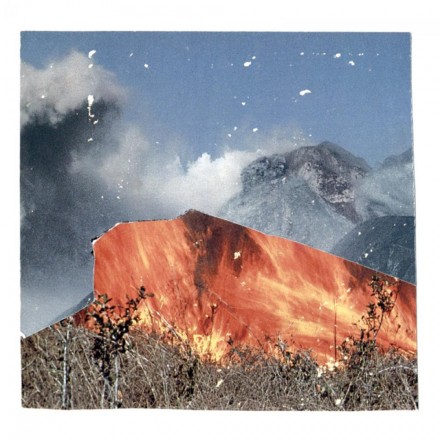Recorded in a church has a kind of nice ring to it. More often than not it’s a novel ring, to be sure, but a church has a certain austere majesty that seems simultaneously foreign and intrinsic to rock music’s classic accompanying stance on established authority and its natural aural reverence. So why not? Yet even the big daddy of recorded in a church albums, Talk Talk’s Spirit of Eden, doesn’t really shout this was recorded in a church!, despite its legend being all candle-lit and divine inspiration. World Unite Lucifer Youth Foundation – aka WU LYF – have a piece of their embryonic anti-whatever legend built right there in their name, not to mention their wholly fuck-off stance to just about any label, magazine, or figurehead trying to give them a – perhaps conditional – hand up. What indie rock band doesn’t need one, right?
So WU LYF decided to inhabit a church for their self-released debut LP, Go Tell Fire To The Mountain, and even if it had ended up as just another slight against something – status quo maybe? – then it would have all fit into place and no one would have batted an eye (if they’d even heard of these guys). But it becomes apparent as the first notes of a church organ waft panorama in thick humming layers of shuddering reverb on Go Tell Fire To The Mountain‘s opener, “L Y F,” that WU LYF is actually pretty committed to making the church part of the band. The earnest question quickly becomes, how are these dudes going to take the church on the road with them?! The ultimate point being, the recording space is actually at least pretty important.
There’s a pivotal moment on “Such A Sad Puppy Dog” after the somber organ prologue, marching drum rolls, and cavernous solitary guitar melody have wrung the shrieking loneliness from the space when all that really shifts is an assertive attention on the crash cymbals. Vocalist Ellery Roberts, who is easily the most consistently discordant thing about the record, even moves out of the way to let the band have their climatic moment. But that crescendo hits with roaring Mogwai force, letting the humming instruments shift from calculated forward-moving prettiness into an abstracted wash of crashing sound folding in on itself. Those peaks are easy to write off with reference points such as the aforementioned post-rock giants as well as a guitar tone that easily sits besides Explosions In The Sky’s ringing cleanliness, but skip back to the loneliness. That’s where Roberts is digging his voice out from the bottom of his vocal cords and yelling with some naked Fugazi force, managing to lace it with gravelly Tom Waits tenderness. It’s exceedingly arresting and gives the expansive sonics some profound, almost demanding, emotional weight, especially when the song has nowhere left to go but to blow up.
Ellery Roberts is a large bullet point on the list of reasons why Go Tell Fire To The Mountain works as well as it does. Grandly speaking, he has perhaps one of the most striking vocal dynamics in music right now, barking out unintelligible anthemic sentiments while simultaneously delivering tearfully melodic resignation. The vocals are often laid at variable levels of intensity atop each other, driving the feeling of collective intent with as much fervency as his delivery. He often sings (or yells) right past the intelligibility of the lyrics as if too emotionally earnest for the English language. The titular line on “Spitting Blood,” is delivered “spit-un bluhhh,” which gives a certain powerful phonetic credence to the onomatopoeic nature of actually spitting blood. It almost doesn’t matter what the songs are about, you usually get the idea, despite the incoherent words. That said, when Roberts sings, “I love you forever and ever and ever and ever…” on “L Y F” the clarity is a kind of revelatory thrown-bone for the listener to hold tight to as a tangible and affecting emotional signpost.
There is the obvious notable contrast between Roberts’ blunt delivery and the lushly treated instrumentation. But there’s a pillowy negative space between all the divergent aesthetics that creates a resounding heft and felt resonance. It’s an extremely physical record. The organ creates a gigantic foreboding droning undertone, the guitar might as well be shooting notes from a canyon, and, with the drums in particular, you can almost feel the force of each stroke. The drums, even more often than the vocals, have the effect of driving the intensity of these songs. There’s a distance that the space allows for them to really just boom. The first appearance of drum and bass on “Such A Sad Puppy Dog” lands with seismic impact. The kick drives at the throat and the crash cymbals are usually the force behind the songs’ more cathartic moments.
With all these congealing elements in place across ten tracks, it results in an emotionally draining experience, to say the least. Each track has a moment where it hits anthem-status and a chorus of Roberts’ voice embody it with some abstracted notion of us-ness. “Concrete Gold” ascends into a fill-heavy rally around some unintelligible chant rising in pitch before dropping into an eye-widening guitar melody. It builds again with the vocals off in the distance and the band playing out the rest of the song caught between smiles and tears. The piano that follows after its crashing end serves as a solemn reminder that maybe WU LYF had a pretty good idea of what they had to offer beyond their evasive beginnings, and the wrenching beauty they could capture within the space they decided to record their debut.


